Feature: Favorite Books of 2017
Some of our critics talk about the books that meant the most to them over the past year.
By Harvey Blume
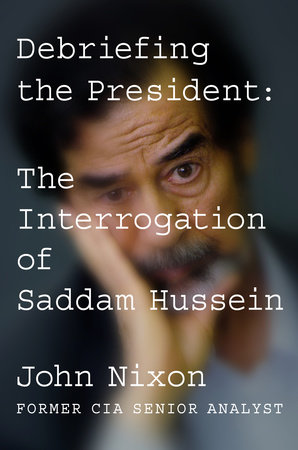
Debriefing the President: The Interrogation of Saddam Hussein by John Nixon
CIA operative John Nixon, assigned to debriefing Saddam Hussein after he was captured in December 2003, came to some curious conclusions about this supposedly deadly menace to the United States — the nukes, the nukes, the yellow cake, the mushroom cloud! First of all, as everybody except perhaps Dick Cheney knows by now, Saddam had nothing to do with the 9/11 attack on the United States. In fact, as per Nixon, Saddam entertained the admittedly fey possibility that 9/11 would bring the United States and Iraq together as natural allies against their common foe, Islamist terrorism.
Near the end, Nixon asks, “Was Saddam worth removing from power?” and replies, “I can only speak for myself when I say that the answer must be no. Saddam was busy writing novels in 2003. He was no longer running the government.”
As Nixon sees it, G.W. Bush and Saddam Hussein were more alike than most historians suggest:
Both had haughty, imperious demeanors. Both were fairly ignorant of the outside world and had rarely traveled abroad. Both tended to see things as black and white, good and bad, or for and against, and became uncomfortable when presented with multiple alternatives. Both surrounded themselves with compliant advisers and had little tolerance for dissent. Both prized unanimity at least when it coalesced behind their own views. Both distrusted expert opinion.
This is a fascinating account, told through the voice of a major protagonist, of a ruinous war that should not have been.
Blitzed: Drugs in Nazi Germany by Norman Ohler
Yes, World War II was, as we know, driven by racism, anti-Semitism, technology, weaponry, oil, cryptography, ideology and dueling forms of totalitarian rule.
In his Blitzed: Drugs in Nazi Germany, Norman Ohler argues it was also driven by drugs. Everyone in Nazi Germany was treated to a form of methamphetamine known as Pervitin. Speed was good for you, and especially good for the Werhmacht soldiers who smashed their opponents and arrived at the coast of France so quickly it astonished the Allied High Command.
It astonished Hitler, too. Ohler suggests he held off from ordering the final assault on the allied forces sheltering at Dunkirk because he wanted the attack to issue from his genius, his personal and inimitable charisma, and not from the chemical substitutes furnished by German industry.
Besides, Hitler had his own vaster pharmacopeia, and his own personal Dr. Feelgood, Dr. Theo Morell, who prescribed whatever he thought necessary — often animal in origin though Hitler was a vegetarian — to keep the Fuhrer going, for on his personal charisma the Reich and its war effort depended.
Blitzed: Drugs in Nazi Germany is a contribution to the understanding of World War II, and will hopefully be factored into future histories of that war.
By Helen Epstein
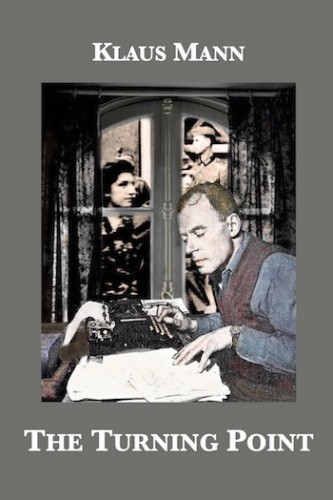 Klaus Mann’s autobiography The Turning Point could not be more timely in our new political reality. Born in 1906, Mann describes his early years but most importantly, his growing awareness of the new political reality of Nazism and his resistance to it after the Reichstag elections of September 1930.
Klaus Mann’s autobiography The Turning Point could not be more timely in our new political reality. Born in 1906, Mann describes his early years but most importantly, his growing awareness of the new political reality of Nazism and his resistance to it after the Reichstag elections of September 1930.
An out gay man, an early opponent of Nazism and a prolific writer, Klaus Mann was also the the son of Thomas and nephew of Heinrich Mann. Writing from NYC in 1941 and 1942, Klaus describes how after one of his working-class bedmates turned up in a storm trooper’s uniform, he knew that all was lost and fled to Paris. He describes expat life as a German refugee in Paris. finding a German Jewish publisher in Amsterdam and the difficulties of starting a journal of emigré writing. In 1934, he was given Czechoslovak citizenship and after Hitler made that passport obsolete, Klaus emigrated to the United States where he stopped reading and writing German. The writer must not cling with stubborn nostalgia to his mother tongue,” he writes in The Turning Point. He also reflects that he never was fooled by Hitler; his big mistake, he wrote, was his overestimation of the German people.
Jenny Erpenbeck’s novel Go, Went, Gone addresses the current refugee crisis, particularly in Germany, where Erpenbeck was born and still lives. A former East German classics professor at Berlin’s Humboldt University retires and finds himself disoriented. He is struck by a group of African refugees on Alexanderplatz and becomes — clumsily at first — involved in their lives.
Erpenbeck’s writing is addictive. Her depiction of the encounter between former East Germans still adjusting to the privileges of Western Europe and Africans of many nationalities and backgrounds is by turns chilling, funny, lyrical, journalistic. She is a masterful and versatile writer and this is a book (ably translated by Susan Bernofsky) that you won’t forget.
By Lucas Spiro
The Seventh Function of Language by Laurent Binet. In this humorous detective novel, Binet imagines an international conspiracy involving some of France’s most notable, and notorious, philosophers. Roland Barthes’s untimely death forces a young doctoral candidate and a national police detective into one another’s “discourse,” which results in plenty of intellectual hilarity.
The Teeth of the Comb by Osama Alomar
Syrian author Alomar provides lots of wit and wisdom in this masterfully crafted collection of very short stories.
The Autograph of Steve Industry by Ben Hersey
My favorite read this year. Steve Industry is a working class hero in suburban Massachusetts who deals with a precarious work situation, his struggling rock n’ roll band, a relationship on the rocks, his complicated relationship with his daughter, and his own sanity.
Joan Nathan has been writing about food for the New York Times and the Washington Post as well as publishing numerous books for over four decades. In order to write the cookbook King Solomon’s Table Nathan traveled to five continents and 15 countries in search of the Biblical origins of foods we eat today. It’s a treasure trove of well-researched recipes and engrossing stories, coupled with clear, easy-to-follow steps to make tasty dishes for the holidays and beyond.
By Matt Hanson
Priestdaddy by Patricia Lockwood
https://www.penguinrandomhouse.com/books/317744/priestdaddy-by-patricia-lockwood/9781594633737/
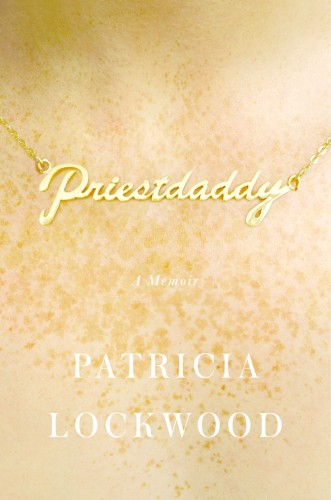
The relatively insular world of poetry was rocked by the publication of Lockwood’s viral poem “Rape Joke” back in 2013, and her irreverent use of Twitter has kept her fan base growing. Her second poetry collection Motherland Fatherland Homelandsexuals is selling impressively given its purview, but by my lights it’s her memoir Priestdaddy, the funniest book I read this year, that rises above the rest. It’s written with the gimlet eye of a born skeptic, a poet’s acute sensitivity to language, and the perfectly calibrated exaggerations of an Irish storyteller.
Lockwood tells the story of growing up absurd as the daughter of a Roman Catholic priest and as an alienated participant in the increasingly creepy concentric circles of Catholic culture “in all the worst cities of the Midwest.” Her father converted after an apocalyptic viewing of The Exorcist aboard a nuclear submarine. Her dad’s eccentricities and blatant slovenliness makes Homer Simpson look like Cary Grant. Lockwood watches agape as her dad prowls around the house clad only in briefs, watching only the goriest of action movies while spread-eagled on the couch, eating self-brined pickles from a jar, and cranking up Rush Limbaugh and Bill O’Reilly on separate radios at the same time. He unwinds by playing epically talentless guitar solos that sound “like a whole band dying in a plane crash in 1972.”
In my favorite of the book’s many uproarious but insightful anecdotes, she and her husband marvel over how he finally won her father over:
“Strange that my dad likes you so much now,” I ponder, “even though you’re a member of the media.”
“I can pinpoint the exact moment it happened,” he says, through a mist of nostalgia. “It was just before we all left for a big family vacation, a year or two after we were married. Your mom had finished packing and was trying to herd everyone into the van, and the dog was barking at the top of her lungs, and one of your little brothers was peeing into a pile of clean laundry, and the rectory was just in total chaos. In the middle of all this, your dad called me into his room, handed me a crisp twenty-dollar bill, and said, “J, I need you to go to Arby’s and get me as many Beef N’ Cheddars as this will buy.” I didn’t ask any questions. I just went and did it.” He stops to remember. “It took me a long time, actually, because to Arby’s credit, the Beef N’ Cheddars are always made fresh.”
“After that, he liked you.”
“After that, I think he loved me.”
White Tears by Hari Kunzru
“When you listen to an old record, there can be no illusion that you are present at a performance. You are listening through a gray drizzle of static, a sound like rain. You can never forget how far away you are. You always hear it, the sound of distance in time. But what is the connection between the listener and the musician? Does it matter that one of you is alive and one is dead? And which is which?”
If, like me, you are a fan of old blues singers, the question of what constitutes authenticity is a tricky one. White Tears is a complex, timely story about two white friends in New York City who are obsessed with finding a recording of a possibly mythical blues song heard by chance one day in Union Square. Their obsession with competitively collecting ancient blues records leads them to a dangerous underground network of shady characters whose interest in the lost artifacts of American music stretches beyond the mere musical. Following their lead puts the reader through a hallucinogenic tour of American pathologies about what authenticity, cultural or otherwise, really means, and what price must be paid for achieving it.
Sing, Unburied, Sing by Jesmyn Ward
Even before the tragedy of Charlottesville, there has been a concerted effort on the part of the hater-in-chief to make the widening gaps in our race relations wider and deeper. Ward’s lyrically titled National Book Award-winning novel brings the reader face to face with the ugly social realities — poverty, racism, and the nightmare of history infusing them both — that exist just outside our public conversation. This would be enough of a feat on its own, but Ward takes us deeper, into the marrow of a biracial family from the Mississippi Gulf Coast who undertake a harrowing, Faulkner-esque journey to the north of the state upon their white father’s release from prison.
The story is narrated in turns by different members of the family, including Jojo, a perspicacious thirteen year old who observes how his drug-addled mother Leonie, lonely baby sister, and their wounded but dauntless Grandfather Pop try to survive not only the barrenness and threat of the present but the ghostly ravages of the past. I found myself actually worrying about the characters whenever I put the book down (something I rarely ever did), but Ward’s occasional forays into magical realism made the difference between fiction and reality seem less distinct, which is to say more important, more urgent, and more true.
By Bill Marx
You should be extending your stay among writers whose genius is unquestionable, deriving constant nourishment from them if you wish to gain anything from your reading that will find a lasting place in your mind. To be everywhere is to be nowhere. — Seneca, Letters from a Cynic, II
I have limited time to read over the year, but here are a few books that made an impression on me that served up the kind of nourishment that should find a “lasting place in your mind.”
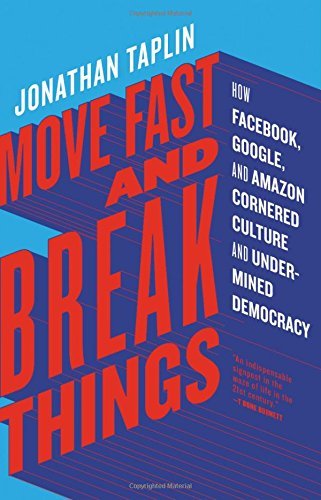
Move Fast and Break Things: How Facebook, Google, and Amazon Cornered Culture and Undermined Democracy by Jonathan Taplin. The libertarian extremism of the tech giants has been targeting arts and culture for years now — raking in profits by making it nearly impossible for artists to make a living by the sweat of their art. The mainstream media didn’t care all that much as the vulnerable book and music industries crashed and burned. But, now that Silicon Valley is zeroing in on American politics and the entertainment/news business, the media’s fat cats are beginning to worry. Taplin, director emeritus of the Annenberg Innovation Lab at the University of Southern California, has written a passionate, readable, well-documented, and seriously frightening book on how the Google, Facebook, and Amazon have decimated arts and culture through undermining copyright, corporate bullying, political pressure, etc. He offers some healthy solutions, including the creation of artist co-ops. For more ideas, check out Andrew Keen’s upcoming How to Fix the Future.
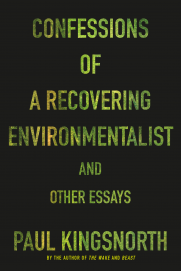
Confessions of a Recovering Environmentalist and Other Essays by Paul Kingsworth. I admire Bill McKibben, Naomi Klein, and others whose necessary warnings about what’s to come, the spoiled fruits of our savage decimation of nature, are tempered by lots of inspiration and can-do calls to action, including the win/win chimera of ‘sustainability.’ But Kingsworth brings a quiet Swiftian fury to his ultimate concern for the fate of the earth, a fear that has now been transformed, in the fact of so much inaction, into a stoic acceptance of utter disaster. Kingsworth is alarmed at why we are not all that alarmed at what is happening. Thus he points a pitiless finger at us:
Simply being human at this time in history — and particularly being a middle-class human in one of the world’s richest nations — makes you, and me, agents of extinction. Much of the Earth’s natural wealth and beauty is disappearing, as our species treats the planet like a giant quarry or factory floor. The Earth’s climate is changing once again. Tipping points are being reached. Much of nature as we know it is dying away in order that we might have access to smartphones, takeaway coffee, private cars, aeroplane flights, and Facebook.
You are not going to encounter this important perspective in a mainstream media dedicated to selling all the consumer goodies that Kingsworth mentions. This volume is invaluable because tells us (across the ideological spectrum) a truth what we don’t want to hear. (“Centuries of hubris block our ears like wax plugs; we cannot hear the message which reality is screaming at us.”) Rilke’s challenge has now become an admonition: “You must change your life.”
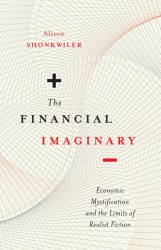
The Financial Imaginary: Economic Mystification and the Limits of Realist Fiction by Alison Shonkwiler. This provocative book deals with a vital aesthetic/moral problem — as economics becomes increasingly abstract can art, specially the craft of realistic fiction, dramatize that is ‘really’ happening? As a theater critic, I have been increasingly puzzled by this issue. Why are our playwright unable to deal with traumatic issues of inequality? Yes, it is because the middle/wealthy finance theater productions, and they don’t want their complicity highlighted. But I also think that traditional modes of storytelling are being challenged: can the arts depict what is happening in an economy driven by Bitcoins?
Global structures of inequality, the politics of immigration, the outsourcing of work, the dismantling of social protections, the ‘realism’ of austerity politics, and all kinds of social, political, and environmental violence are very real. Financialization specializes in putting distance between these concrete effects and structural violence of an abstract value that is measured by nothing but the stock market.
Of course, that emphasis on “distance” and “abstract value” is driven by those in the economy that want to keep us in the dark by separating consumers from the ‘violence’ (to human beings and nature) required for the profitable manufacture and selling of its products. Shonkwiler looks back at books involving finance from around the turn-of-the-century by William Dean Howells, Henry James, Frank Norris, and Theodore Dreiser, comparing and contrasting their approaches with , among others, those of Jame Smiley in Good Faith, Richard Powers in Gain, and Don DeLillo in Cosmopolis (the latter a particularly good discussion). Her response, after looking at these and other novels, is that writers and artists can articulate/critique what is going on in the economy around us. By self-consciously rewriting the storylines handed us by big finance and conventional realism: “literary realism both expresses and mediates the representational dilemmas of finance capitalism. In so doing, realism promises to reveal more deeply the narrative structures of finance itself.”
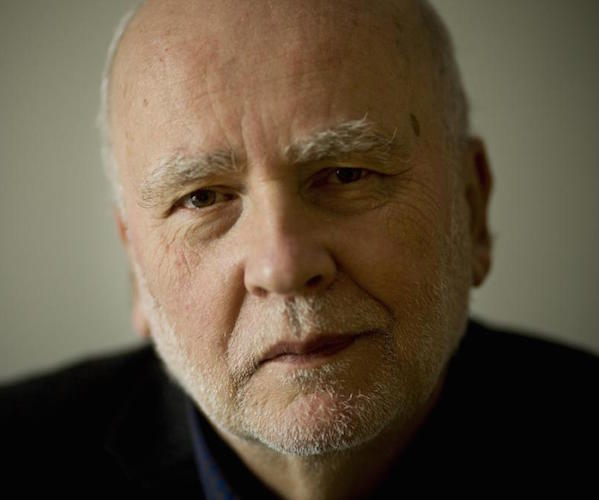
Poet Adam Zagajewski — he excavates the tradition of central European poetry and thought while keeping a wary eye on the future.
Slight Exaggeration by Adam Zagajewski. Translated by Clare Carvanagh. Anything this brilliant Polish poet writes should be lovingly attended to; the elegiac wisdom and rueful, civilized lyricism in this rich volume of criticism (on D.H. Lawrence, Paul Valéry, Zbigniew Herbert, and others), personal reflection, historical analysis, and aphorisms is filled with what he calls “instants of elation.” One of my favorites:
How to describe the way these two waves of reality, the world and dreams, meet, do battle, fail to reach agreement, conclude short-lived treaties that are immediately broken, how at dawn they stare at one another uncomprehendingly, being to build bridges again by evening, and then once more turn furiously upon each other, with a passion mixing love and hate, and afterward, drift to sleep by the side of a highway leading nowhere, on an embankment where weeds grow with their heady scent.
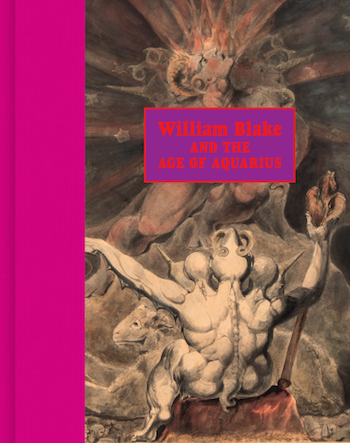
William Blake and the Age of Aquarius, edited by S. F. Eisenman, does the poet and the counterculture proud. This volume of essays, written to accompany an exhibition (at the Mary and Leigh Block Museum of Art, Northwestern University, through March 11), explores the “American Blake Revival,” focusing on the 1960s. (Allen Ginsberg’s enthused advocacy is emphasized). The entries offer illuminating (if sometimes hyperventiling) examinations of the influence of Blake’s art on ‘the summer of love,’ poster art, rock music, and abstract expressionism (apparently, Jackson Pollock had a Blake work pinned to his studio wall).The more specific the essay the better. Mark Crosby’s “Sendak, Blake, and the Image of Childhood” is a perceptive look (with plenty of contrast and compare visuals) at how Sendak’s “use of Blakean imagery seems to synthesize Blake’s states of innocence and experience…”
Gish Jen is a friend, so that is out in the open, but there is no denying that her non-fiction study The Girl at the Baggage Claim: Explaining the East-West Culture Gap brings considerable smarts and vitality to an important conversation about the power of cultural contrasts to illuminate as as well as confuse. Of course, these contraries will play an increasingly significant role in the ongoing relationship between East and West. As the Arts Fuse critic wrote of the book: “what could easily have become a dense, jargon-filled work of social and cultural psychology instead reads like a thoughtful conversation about different understandings of the self and how those understandings shape individuals’ and societies’ world views on everything from business to family and even art.” Jen”s efforts at understanding becomes particularly necessary at a time America is wallowing in self-admiring proclamations of its exceptionalism.
Two novels that caught my fancy:
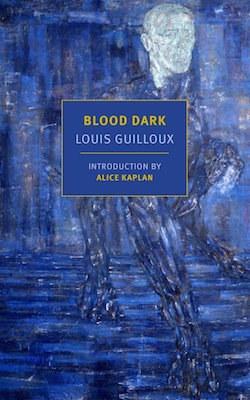
Blood Dark by Louis Guilloux, translated from the French by Laura Marris. A rip-roaring curse on combat, a grotesque farce set in World War I that dramatizes (over the course of a single day in a port town in Brittany) the absurd trials and tribulations of a difficult-to-classify (though always entertainingly unsavory) intellectual bully, an anti-militarist anti-hero who has nothing but dismissive disgust for the mounting slaughter of war and the provincial conformity that’s festering around him. Through a number of eccentric figures, Guilloux dramatizes vulgarity, panic, despair, and toadyism with memorable comic ferocity; the novel, published in 1935, was favored by Albert Camus, Louis Aragon, André Gide, and, no surprise here, Louis-Ferdinand Céline. (Though Guilloux is far more adept than Céline at creating a world of lively characters.)
The Dispossessed by Szilárd Borbély. Translated from the Hungarian Ottilie Muzlet. A masterpiece inspired by the unbearably painful adolescence of poet Borbély (1963-2014), who grew up in a family struggling to rise above dire poverty (and ostracized because of suspicions of their Jewish background) in a remote Hungarian village during the 1960s. Overpowering prose — tart, brusque, lyrical, and macabre — at the service of articulating existence at the lower depths.
